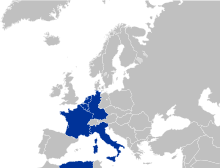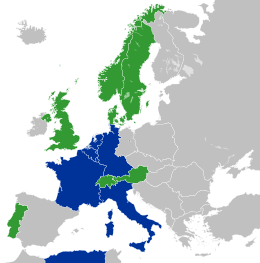Inner Six
The Inner Six (also known as the Six or the Six founders) refers to the six founding member states of the European Union, namely Belgium, France, West Germany, Italy, Luxembourg, and the Netherlands.
The Inner Six are those who responded to the Schuman Declaration's call for the pooling of coal and steel resources under a common High Authority.
The six signed the Treaty of Paris creating the European Coal and Steel Community on 18 April 1951 (which came into force on 23 July 1952).
However, the Benelux countries (Belgium, the Netherlands, and Luxembourg) and West Germany desired a common market.
[2] The four countries resubmitted their applications on 11 May 1967 and with Georges Pompidou succeeding Charles de Gaulle as French President, the veto was lifted.

